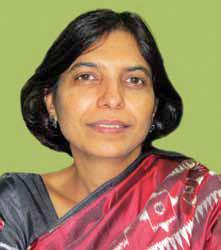 Arti Ahuja provides her inputs on the steps that are being taken to ensure the welfare of young mothers and infants in the State of Odhisa. In conversation with Nayana Singh
Arti Ahuja provides her inputs on the steps that are being taken to ensure the welfare of young mothers and infants in the State of Odhisa. In conversation with Nayana Singh
What is your vision for the women and child development in State of Odisha?
A number of things have to be done; we have to take a holistic view of the living conductions of the majority of the women and children in the State. In Odisha, we have taken up number of initiatives, which target women right from the moment of conception and till the time when their children turn into adults. We are doing a number of things to provide protection and facilities to the women and children. While providing such services, we also need to taken into the society’s perception of women and children. There are lot of issues that need to be addressed.

How are you addressing issues such as IMR? Please highlight the challenges which are hindering development?
I would like to inform you that IMR is coming down in the state due to the concerted efforts of various departments. Infant mortality rate is impacted by various factors, which are mostly are related to neo-natal mortality. We now have the conditional cash transfer scheme called ‘Mamata’ where we make direct cash transfers to the account of the woman subject to her fulfilling certain conditions. We are also discovering that the acceptance of health services have gone up as a result of Mamata Scheme. In one year of its operation we have been able to cover nearly six lakh women through the scheme; the money goes directly into their accounts through transfers. So there is hardly any leakage, it’s been a successful scheme and I think we will be able to achieve considerable success in bringing down IMR and MMR.

Tell me more about the benefits that are being provided to expected mothers and to infants?
We are providing cash transfers for prenatal and post-natal checkups, getting the immunization done, and other areas where urgent healthcare is needed. We also have programmes for providing supplementary nutrition to the mother and child. The programmes for supplementary nutrition are decentralised to the village level. The nutrition to expecting mothers and to the children of less than three years is being provided through self help groups. To ensure that there the meal is healthy, we provide specific guidelines and recipes to the self-help groups, which operate at the village and community levels. It is a successful model as it leads to the involvement of many members of the village community. There is total decentralisation and the local people have more say in it.
What are you doing to address the problem of child labour, which is quite alarming in this part of the country?
The issue of child labour is being handled by the labour department. As a part of our child protection programme, we seek to bring better synergy between the labour department and other departments. We are trying to map the areas from where most of the child labourers are coming. We are trying to do all we can to ensure that every child in the state gets proper education and other facilities.
What sort of ICT initiatives you are adopting for the purpose of ensuring better service delivery to the remotest village?
I would like to tell you about Mamata, one of the largest social sector projects of its kind in the country. Under this scheme cash transfers are made directly to the bank accounts of the women. We are using the e-pragati, our website very well. The details of all our schemes and other relevant information are available on the website. We have
the dashboard monitoring system through which we monitor all the districts for various indicators and parameters. We have a ready checklist for supervisory officers and all of that is monitored in website. We also have an e-group of our field level officers. Lot of information dissemination and communications take place through the e-group.
What sort of the assistance are you getting from the NGO’s?
Our department works in very close coordination with the NGO’s in the whole ICDS programme, our social audit is done by the NGO. They only have found that the decentralization model has been quite effective. Similarly in other fields we run lots of women homes, special schools for children with disabilities, old age homes all these are run through NGO’s, so there is strong partnership with them in this department.
Be a part of Elets Collaborative Initiatives. Join Us for Upcoming Events and explore business opportunities. Like us on Facebook , connect with us on LinkedIn and follow us on Twitter, Instagram.











